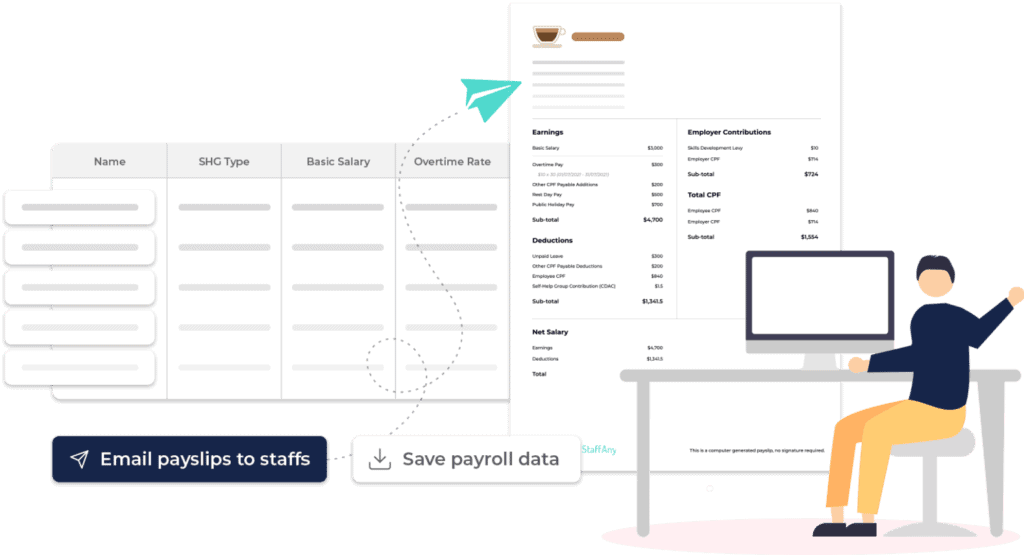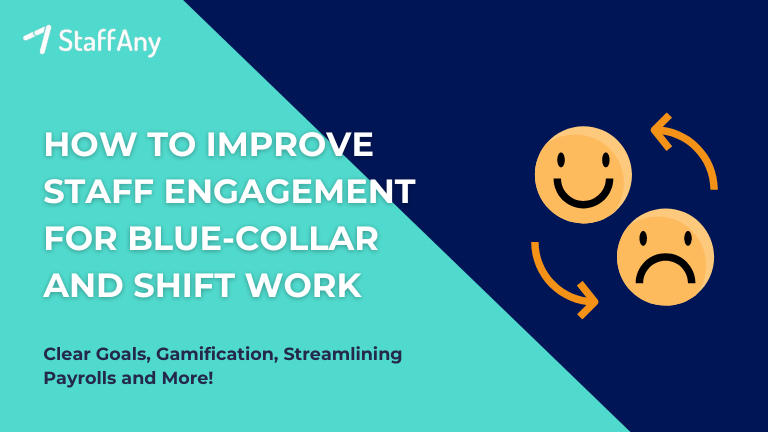Whether higher wages lead to increased productivity has sparked numerous debates in the ever-evolving landscape of business management and employee motivation. As companies strive to optimise their operations and achieve greater efficiency, understanding the intricate relationship between wages and productivity becomes imperative.
In this article, we will answer the question: “Do higher wages increase productivity?” investigating the potential impact of higher wages and highlighting the significance of maintaining a productive workforce for business success. But first, let’s explore the concept of employee productivity. Let’s get started!
What is Employee Productivity?

Employee productivity refers to the level of output a worker generates within a given period, often measured against a set of predefined goals or industry benchmarks. It’s a pivotal metric that offers insights into the effectiveness of individual employees and the workforce.
The productivity of a workforce directly influences a company’s ability to meet deadlines, fulfil customer demands, and ultimately achieve sustainable growth.
What is the Relationship between Wage and Productivity?
The age-old question of: “Do higher wages increase productivity?” has sparked numerous debates. As businesses strive to optimise their operations and achieve greater efficiency, understanding the intricate relationship between wages and productivity becomes imperative.
A study conducted by the Workplace Research Foundation unfolds a compelling narrative, shedding light on the potential impact of higher wages on productivity. The study brings forth a noteworthy revelation: a mere 10 per cent increase in investments to nurture employee engagement can translate into a substantial upswing of $2,400 in profits per employee per year.
This revelation underscores the strategic imperative of cultivating approaches to amplify workforce productivity. The findings of this study add weight to the ongoing discourse surrounding the connection between wages and productivity.
While the direct link between wage increments and productivity isn’t always linear, the study highlights the importance of employee engagement as a driving force behind performance improvements. The new research shows that raising the minimum wage improves workers’ productivity, which translates into businesses offering higher-quality service.
Engaged employees tend to invest extra effort, amplifying efficiency and output. When combined with thoughtful strategies for engagement, higher wages can fuel this positive cycle, ultimately contributing to a more prosperous bottom line.
It’s crucial to note that the relationship between wages and productivity is multifaceted. A well-rounded approach encompassing fair compensation, skill development, and a supportive work culture is essential.
Higher wages, within the context of a holistic strategy, can catalyse positive change. As businesses navigate this terrain, keeping in mind their industry, company dynamics, and workforce composition will be pivotal.
Why Is Wage Growth Important for Employees?
Wage growth is crucial for employee productivity for several reasons:
1. Motivation and Morale
When employees see an increase in their wages, it serves as a recognition of their efforts and contributions. This recognition can boost morale and motivation, leading to increased job satisfaction and a more positive work environment. Motivated employees are generally more engaged and productive.
2. Financial Stability
Adequate wage growth contributes to the financial stability of employees. Financial stability reduces stress and distractions related to personal financial concerns, allowing employees to focus more on their work.
When employees are not preoccupied with financial worries, they can channel their energy and attention towards their job responsibilities.
3. Retention of Talent
Offering competitive wages helps in retaining skilled and experienced employees. High employee turnover can be costly for businesses due to recruitment, training, and onboarding expenses.
When employees feel that their compensation reflects their value to the organization, they are more likely to stay with the company, contributing to organizational continuity and productivity.
4 .Attracting Top Talent
Competitive wages also play a role in attracting top talent to an organization. Companies that offer attractive compensation packages are more likely to draw in qualified and skilled individuals.
This influx of talent can enhance overall productivity as the workforce is composed of capable and motivated individuals.
5. Increased Commitment
Employees who perceive that their efforts are rewarded with fair and increasing compensation are more likely to feel a sense of commitment to the organization. This commitment can translate into higher levels of dedication and effort in performing job tasks, leading to improved productivity.
In summary, wage increases are not just a matter of financial remuneration; it’s a key factor influencing employee motivation, commitment, and overall job satisfaction. When employees feel valued and fairly compensated, they are more likely to be engaged, productive, and contribute positively to the success of the organization.
Is there a Minimum Wage in Singapore as of 2023?
The minimum wage in Singapore refers to the legally mandated lowest payment a worker can receive for their labor. While many countries establish a universal minimum wage applicable to all workers, Singapore does not have a general minimum wage, except for those employed in the cleaning and security sectors.
As of January 2014, cleaners are entitled to a minimum monthly wage of $1,000, and starting from September 2016, security guards have a minimum monthly wage of $1,100. The most recent alteration to Singapore’s minimum wage occurred on September 1, 2016.
Due to the absence of a minimum wage in Singapore, there is no compulsory baseline for the remuneration of workers. Instead, individuals must negotiate their pay directly with employers, either through collective bargaining or other methods aimed at establishing a fair and sustainable living wage.
Read more: How Much Waiter Minimum Wage in Singapore?
The Importance of Employee Productivity in Business
Employee productivity is a linchpin for success in the dynamic business landscape. As we explore its significance, let’s delve into ten compelling reasons why nurturing employee productivity is paramount:
1. Operational Efficiency
The productivity of a workforce directly impacts the efficiency of daily operations. A highly productive team can complete tasks more swiftly and accurately, leading to streamlined processes and reduced delivery times. This operational agility enhances customer satisfaction, optimises resource allocation, and minimises operational bottlenecks.
2. Customer Satisfaction
High productivity contributes to improved customer experiences. With tasks completed promptly and effectively, customers receive the products or services they require in a timely manner. This leads to enhanced customer satisfaction, loyalty, and positive word-of-mouth, which is vital for sustaining a thriving customer base.
3. Innovation and Growth
A productive workforce isn’t limited to routine tasks; it possesses the capacity to drive innovation. Employees who efficiently manage their daily responsibilities often have the time and mental space to think creatively and contribute to developing new ideas, products, and services. This culture of innovation fuels a company’s long-term growth and competitiveness.
4. Employee Retention
Recognising and rewarding productivity is a key factor in retaining valuable talent. When employees feel that their hard work is acknowledged and rewarded, job satisfaction and morale increase. This positive reinforcement fosters a sense of loyalty to the organisation, reducing turnover rates and preserving institutional knowledge.
5. Company Culture
Productivity is closely intertwined with company culture. A workplace that values and encourages productivity cultivates a culture of excellence. Employees are more likely to collaborate, share knowledge, and support one another, creating an environment conducive to personal and collective growth.
6. Adaptability
In an ever-changing business landscape, adaptability is essential. A highly productive workforce is better equipped to adapt to shifts in market trends, industry dynamics, and technological advancements. Their ability to quickly learn and implement new strategies positions the company for long-term success.
7. Competitive Edge
High productivity is a strategic advantage. It enables a company to respond swiftly to market demands, outpace competitors, and capitalise on emerging opportunities. A productive organisation can seize the initiative in a fast-paced environment, positioning itself as an industry leader.
8. Resource Optimisation
Productivity maximisation extends beyond time efficiency. It also encompasses the optimal utilisation of resources. A workforce that operates at peak productivity ensures that resources, including time, materials, and human capital, are used effectively, minimising waste and reducing costs.
9. Employee Well-Being
Striking a balance between productivity and employee well-being is essential for long-term success. A sustainable level of productivity considers factors such as work-life balance, mental health, and job satisfaction. Employees who feel supported and valued are more likely to maintain high productivity levels.
10. Strategic Focus
A productive workforce enables leadership to shift their focus towards strategic initiatives. When the operational aspects are efficiently managed, decision-makers can allocate more time and resources to long-term planning, innovation, and growth strategies, steering the organisation towards its objectives.
In conclusion, the question of “Do higher wages increase productivity?” is a topic that continues to captivate the attention of business leaders and researchers alike. The insights from the Workplace Research Foundation study shed light on the potential synergy between employee engagement, higher wages, and enhanced profitability.
Generate Payslips for Staff with Singapore Payslip Generator

While the direct impact of wage increases on productivity may vary, it’s evident that when combined with thoughtful strategies to foster engagement, businesses can unlock a positive cycle of motivation, efficiency, and output.
As you navigate the complexities of employee productivity, remember that a holistic approach is key. A well-rounded strategy encompassing fair compensation, skill development, and a supportive work culture is essential for sustained productivity gains.
By cultivating a work environment that recognises employees’ individual and collective contributions, you can harness the transformative power of productivity to drive your business forward.
Looking to optimise your payroll process and manage compensation efficiently? Consider leveraging tools like StaffAny’s payslip generator. This free template empowers you to streamline pay periods with ease.
From generating accurate payslips for salaried and hourly employees to delivering them promptly via email, this tool simplifies your payroll management. It allows you to dedicate more time to enhancing workforce productivity and achieving your business objectives. Contact StaffAny today to learn more!













